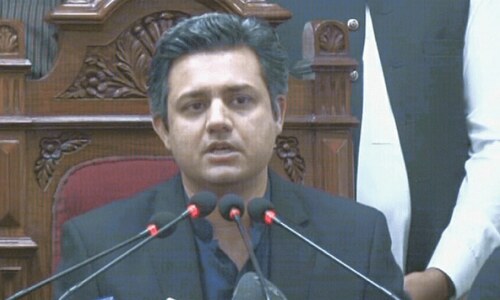ISLAMABAD: Former chief of general staff retired Gen Ishfaq Nadeem on Thursday said the endgame in Afghanistan held considerable promise for Pakistan and the region.
“Developments are evolving rapidly as USA wishes to limit involvement in overseas conflicts. Peace is possible if US negotiations with the Taliban are successful,” he said speaking at a discussion on the regional situation organised by Institute for Policy Reforms.
The retired general, however, said if diplomatic efforts failed and the US withdrew unilaterally the Afghan conflict would prolong indefinitely.
Afghanistan has become a ground for proxy wars, especially between India and Pakistan, he said, adding relations between the two countries had a bearing on restoration of peace.
But he expressed the hope that all US agencies would work together to successfully conclude the endgame in Afghanistan, saying the US must also support reconstruction of Afghanistan to sustain peace.
Humayun Akhtar Khan, chairperson Institute for Policy Reforms, said: “We must avoid repeat crisis in South Asia. Pakistan has been the more thoughtful and restrained party in South Asia’s recent crisis [Pakistan India conflict].”
He said the credit for [defusing the situation] goes to Prime Minister Imran Khan whose leadership prevented a hazardous situation from escalating further.
“There has been international appreciation of our conduct,” he said and added that the recklessness of Indian reaction to the Pulwama attack carried grave risks.
By dismissing the human tragedy in Kashmir as a foreign conspiracy, India is shirking from its responsibility to the people of Kashmir, he added.
General Asif Yasin, former corps commander Peshawar, said many regions around the globe had been in turmoil since WW II.
South Asia especially has been in constant turmoil since 1948. None of the South Asian countries has successfully improved the well being of their people or realised their potential.
He said world powers had armed these countries and also manipulated their policies. As a consequence, these countries remain in poverty and in dismal social state.
Dr Moeed Yusuf, author of Brokering Peace in Nuclear Environments, a book that studies India-Pakistan crises, argued that Indian and Pakistani behaviour in the latest crisis was influenced by the Uri incident of 2016. He said emboldened by international sympathy after Pulwama, Prime Minister Modi felt pressured to go further than he had after Uri. However, Mr Modi miscalculated Pakistan’s response threshold.
Renowned analyst Rahimullah Yousufzai discussed the implication of the new Pakistan-India crisis.
Author Ahmed Rashid dwelled on the opportunity cost of instability and the potential for regional economic cooperation. He said for many years Pakistan had failed to take advantage of the enormous benefits to be gained from connectivity and communications in its near neighborhood and now with the possible winding down of the war in Afghanistan, Pakistan has a huge opportunity to benefit from its neighbours.
Published in Dawn, March 8th, 2019












































Dear visitor, the comments section is undergoing an overhaul and will return soon.